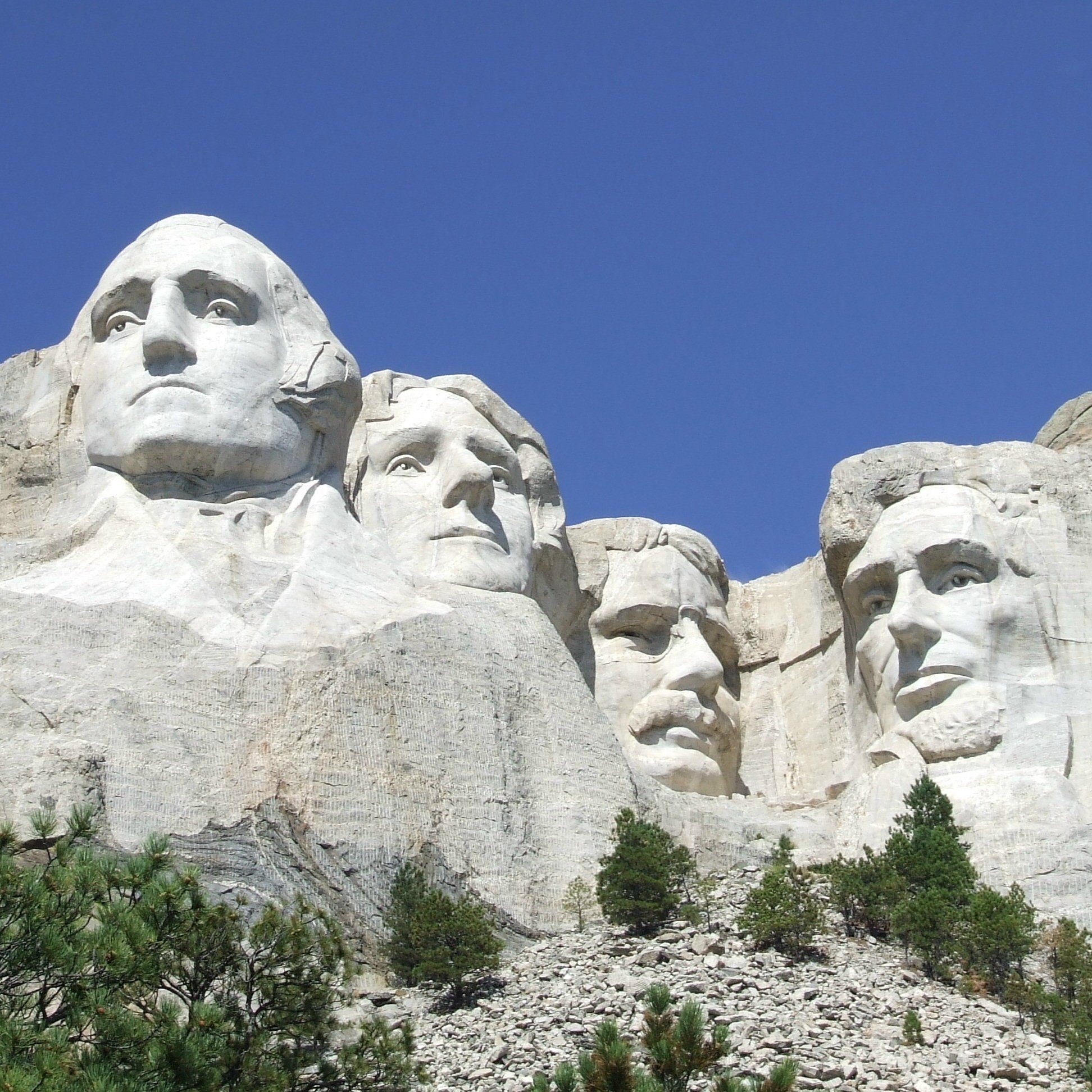

On January 20th, Donald Trump became the 45th President of the United States. At that moment, he also became by far the richest president the nation has ever had — and will likely have for some time.
The wealthiest president before Trump was the very first. George Washington’s Virginia plantation, Mount Vernon, consisted of five separate farms on 8,000 acres of prime farmland. As president, Washington earned significantly more than his successors–his salary was 2% of the total U.S. budget in 1789. However, even with his salary, Washington does not even come close to Trump’s net worth, which is estimated at anywhere between $2.9 billion to $10 billion.
[in-text-ad]
Based on our estimates of estates and incomes, 24/7 Wall st. reviewed the 10 richest American presidents.
Click here to see the 10 Richest U.S. Presidents.
Click here to see the 8 Poorest U.S. Presidents.
Click here to see the net worth of every president.
Since Trump has not made his tax returns public, his net worth is difficult to assess. Conflicting statements from the real estate tycoon himself further complicate the accuracy of any estimate. Estimates have ranged from less than $3 billion to over $8 billion. In his financial disclosure documents submitted while running for office, Trump himself claimed a net worth of $10 billion.
While other presidents, even those who were multi-millionaires, have sought to keep their wealth in the background, Trump’s affluence is very much a part of his identity. Throughout his campaign, Trump has touted his net worth as proof of his skill as a dealmaker and a shrewd businessman.
As president, Trump is expected to have entirely divested himself of his assets so as to avoid a conflict of interest. Much to the chagrin of many political ethicists, however, Trump maintained ownership of his empire, but ceded temporary control of those businesses to his eldest sons while he is in office. This caused some backlash and complications in the days leading up to the inauguration and through the first few weeks of his presidency.
In 2010, 24/7 Wall St. published The Net worth of Every American President, from George Washington to Barack Obama. We have updated our figures each year to reflect the earnings of the still-living presidents. Through this analysis, we identified the 10 presidents with the highest net worth. In this year’s updated list, the only living president who is counted among the 10 wealthiest, besides Trump, is Bill Clinton. If elected, Hillary Clinton would also have been counted among the wealthiest presidents.
The net worth of America’s presidents is often tied to the economic conditions of their time. It is not surprising therefore to find that the first few presidents were owners of large plantations, farmlands, and slaves. They generally made money from crops and commodity speculation. This left them also highly vulnerable to poor crop yields and the risk of losing most or all of their properties because of a few bad years.
Herbert Hoover made millions of dollars as the owner of mining companies. Many more presidents, including Theodore Roosevelt, Franklin D. Roosevelt, Kennedy, and both George W. and George H.W. Bush inherited wealth their families generated during the industrial revolution and the gilded era.
Click here to read our methodology.
This is 24/7 Wall St.’s list of the richest U.S. presidents.
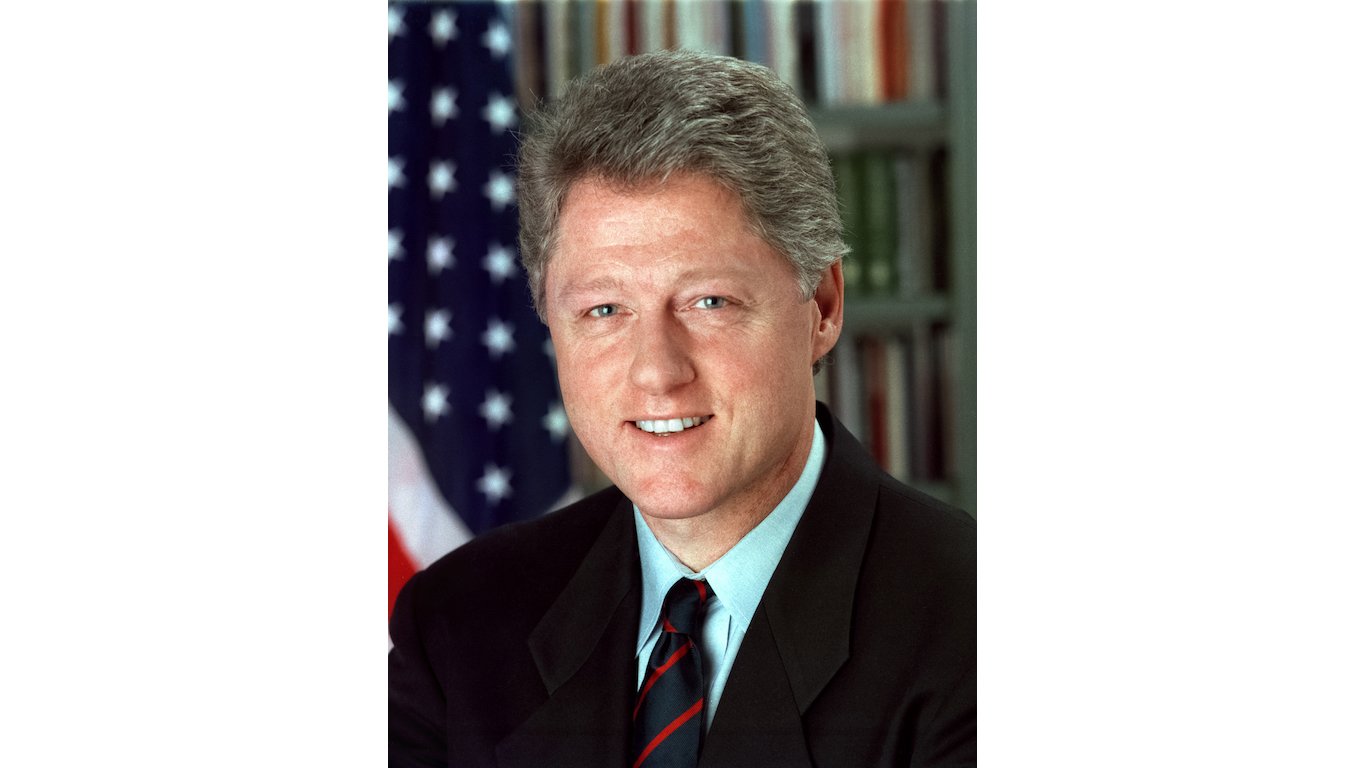
10. William Jefferson Clinton
> Net Worth: $75 million
> In office: 1993 – 2001
> 42nd President
Unlike several presidents, Bill Clinton did not inherit any wealth and gained little net worth during his 20 plus years of public service. After his time in the White House, however, he earned a substantial income as an author and public speaker. In 2005, Clinton earned a $15 million advance on his book “My Life.” In March 2014, the former president was paid $500,000 alone to speak in London to Bank of America. Former Secretary of State Hillary Clinton, whose assets are shared by her husband, has also contributed to the family fortune since leaving office.
In 2014, she received a $14 million advance for her autobiography “Hard Choices.” Mrs. Clinton receives similar speaking fees as her husband, albeit at a lesser volume since she began to dedicate more time to her 2016 presidential campaign. According to Mrs. Clinton’s personal financial disclosure with the Federal Election Commission, in just one month in 2014, Mr. Clinton earned more than $1.9 million for just six speeches.
[in-text-ad]
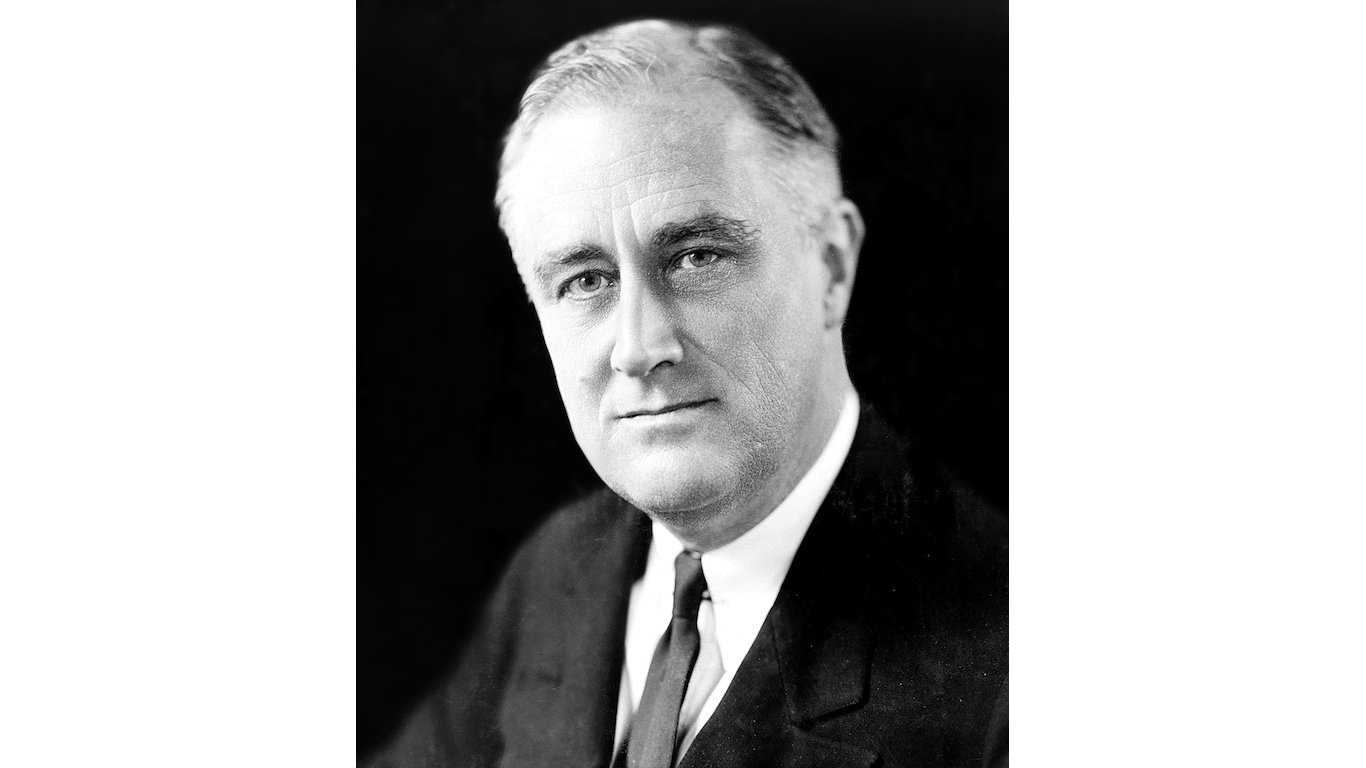
9. Franklin Delano Roosevelt
> Net worth: $66 million
> In office: 1933 to 1945
> 32nd President
Roosevelt’s wealth came through inheritance and marriage. He owned the 800-acre Springwood estate, as well as properties in Georgia, Maine, and New York. In 1919, his mother had to bail him out of financial difficulty. He spent most of his adult life in public service. Before he was president, Roosevelt was appointed assistant secretary of the Navy by President Wilson.
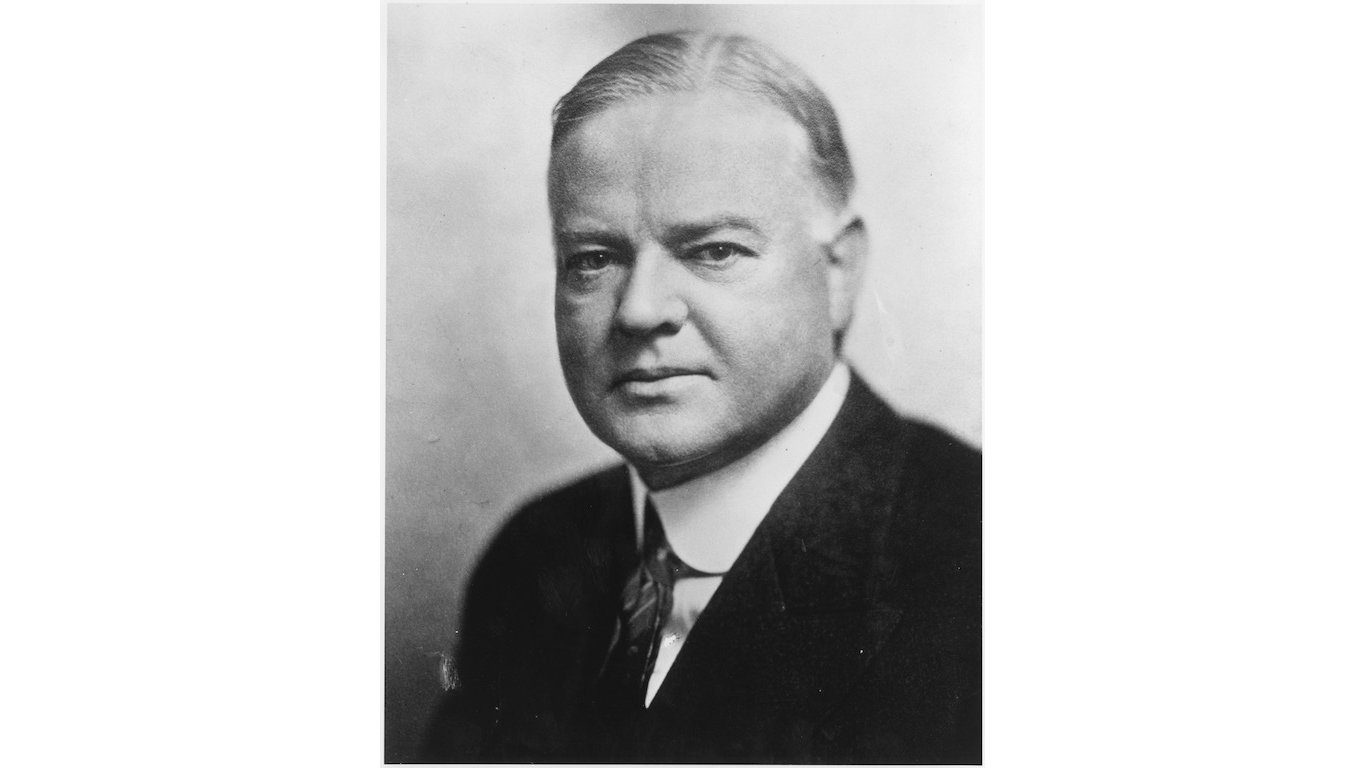
8. Herbert Clark Hoover
> Net worth: $82 million
> In office: 1929 to 1933
> 31st President
An orphan, Hoover was raised by his uncle, a doctor. Hoover made a fortune as a mining company executive. He had a generous salary for 17 years and had extensive holdings in mining companies. Hoover donated his presidential salary to charity. He also owned “Hoover House” in Monterey, California.
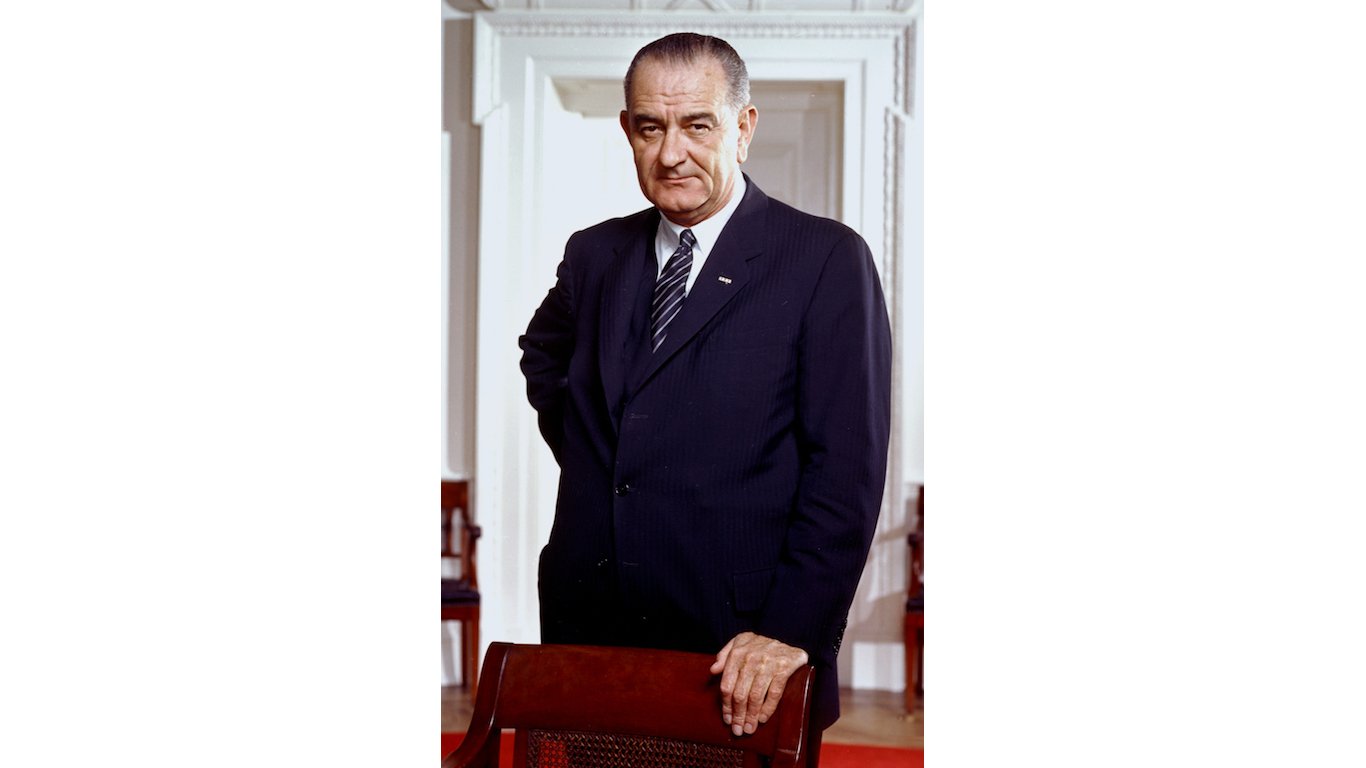
7. Lyndon Baines Johnson
> Net worth: $108 million
> In office: 1963 to 1969
> 36th President
Johnson’s father lost all the family’s money when LBJ was a boy. Over time, the 36th president had accumulated 1,500 acres in Blanco County, Texas, which included his home, called the Texas White House. He and his wife owned a radio and television station in Austin, Texas, and they had a variety of other moderate holdings, including livestock and private aircraft.
[in-text-ad]
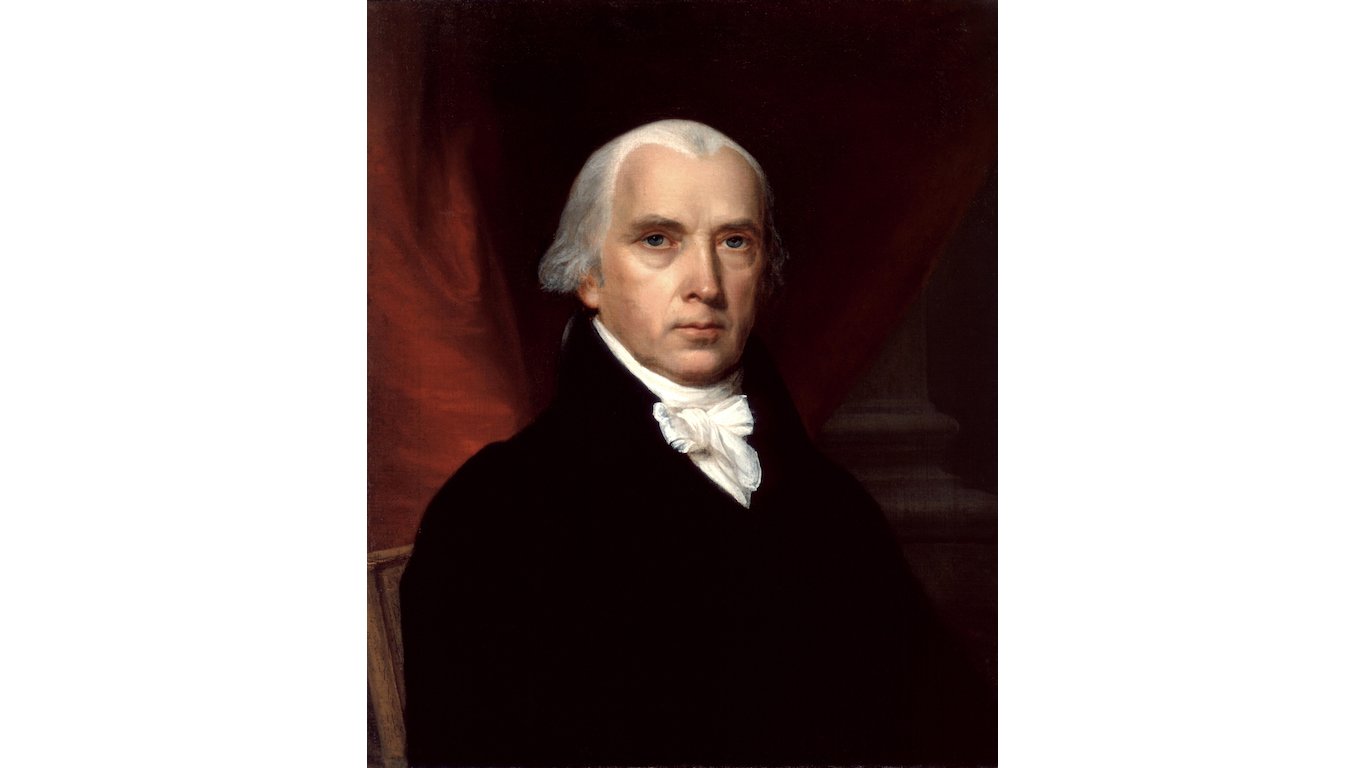
6. James Madison
> Net worth: $112 million
> In office: 1809 to 1817
> 4th President
Madison was the largest landowner in Orange County, Virginia. His land holding consisted of 5,000 acres and the Montpelier estate. He made significant wealth as Secretary of State and president. Madison lost money at the end of his life due to the steady financial collapse of his plantation.
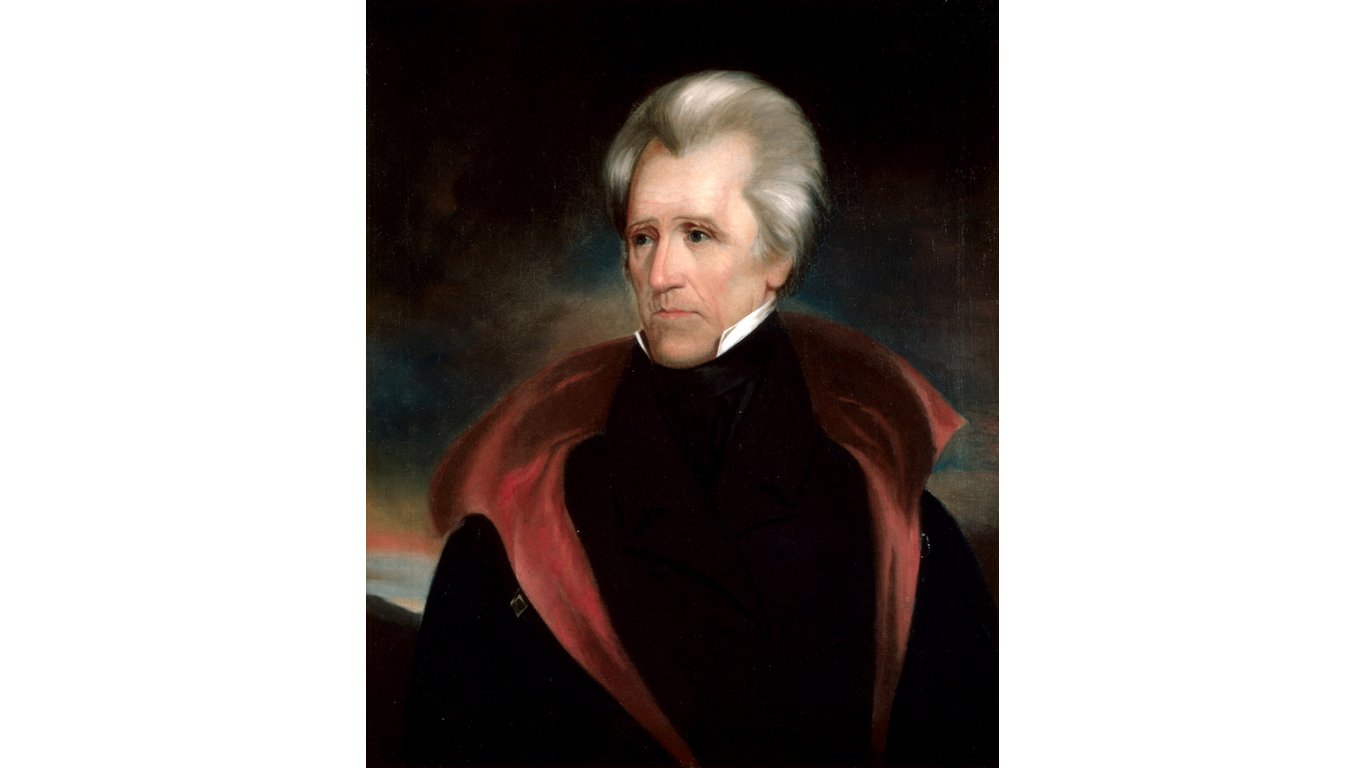
5. Andrew Jackson
> Net worth: $131 million
> In office: 1829 to 1837
> 7th President
While he was considered to be in touch with the average middle-class American, Jackson quietly became one of the wealthiest presidents of the 1800s. “Old Hickory” married into wealth and made money in the military. His homestead, The Hermitage, included 1,050 acres of prime real estate. Over the course of his life, he owned as many as 300 slaves. Jackson entered considerable debt later in life.
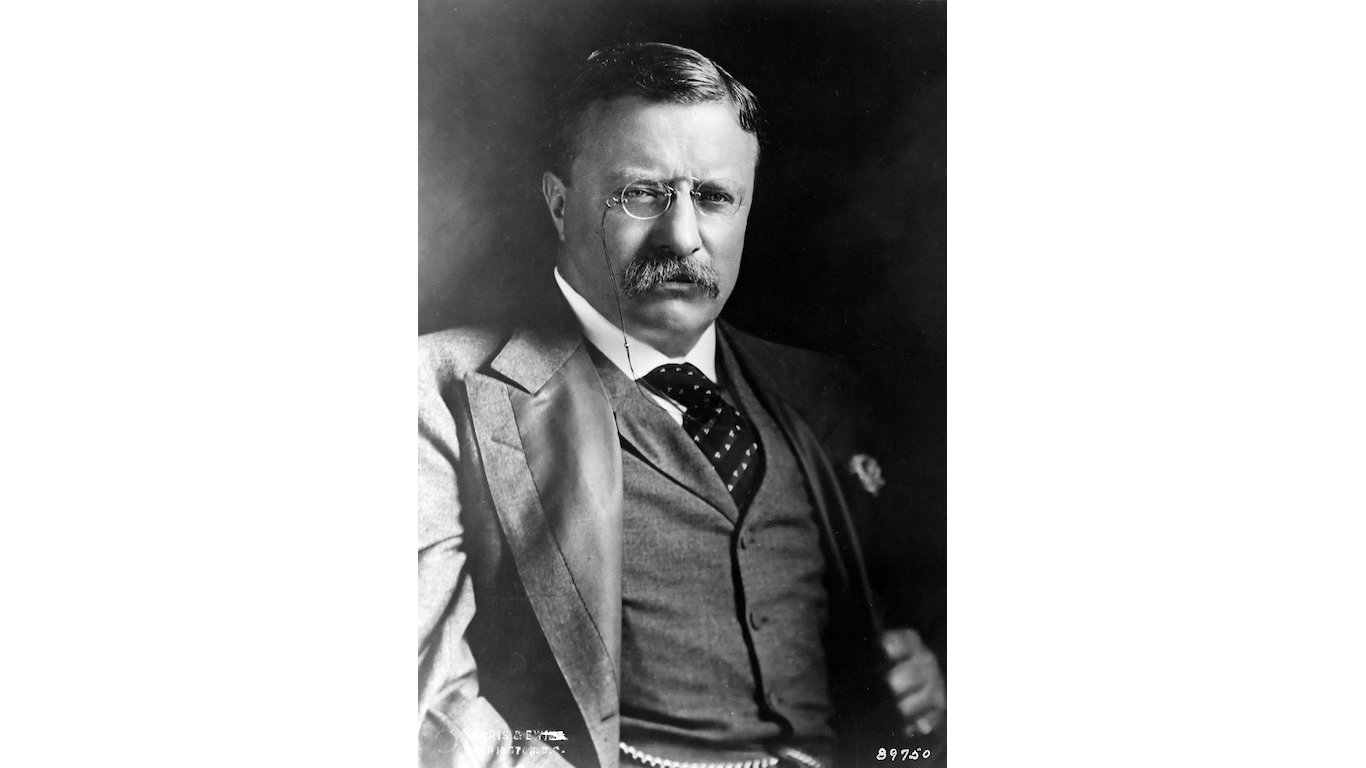
4. Theodore Roosevelt
> Net worth: $138 million
> In office: 1901 to 1909
> 26th President
Born to a prominent and wealthy family, Roosevelt received a sizable trust fund. He lost most of his money on a ranching venture in the Dakotas and had to work as an author to pay the bills. Roosevelt spent most of his adult years in public service. His 235-acre estate, Sagamore Hill, now sits on some of the most valuable real estate in Long Island.
[in-text-ad]
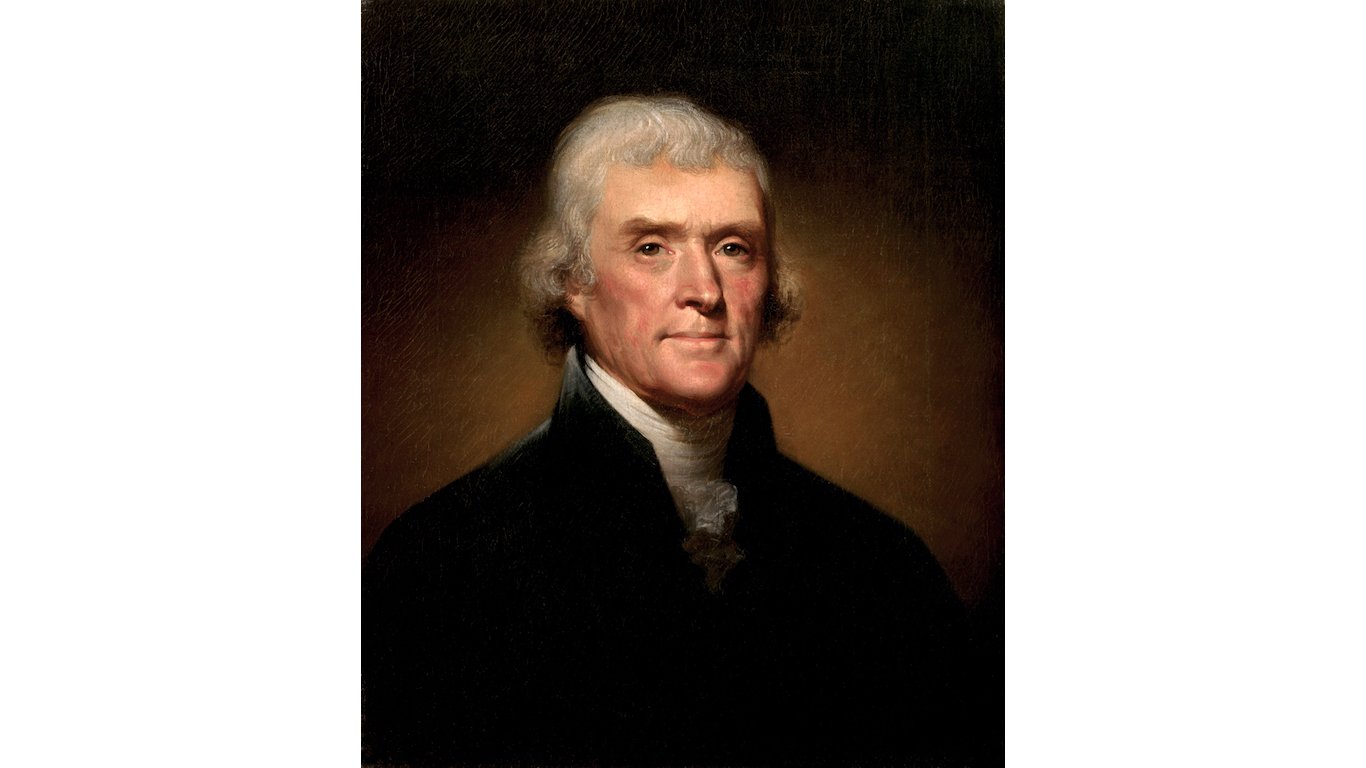
3. Thomas Jefferson
> Net worth: $234 million
> In office: 1801 to 1809
> 3rd President
Jefferson was left 3,000 acres and several dozen slaves by his father. Monticello, Jefferson’s home on a 5,000-acre plantation in Virginia, was one of the architectural wonders of its time. He made considerable money in various political positions before becoming president, but he was mired in debt towards the end of his life.

2. George Washington
> Net worth: $580 million
> In office: 1789 to 1797
> 1st President
Washington’s Virginia plantation, Mount Vernon, consisted of five separate farms on 8,000 acres of prime farmland run by more than 300 slaves. His wife, Martha, inherited significant property from her father. As president, Washington earned well more than subsequent presidents: his salary was 2% of the total U.S. budget in 1789.
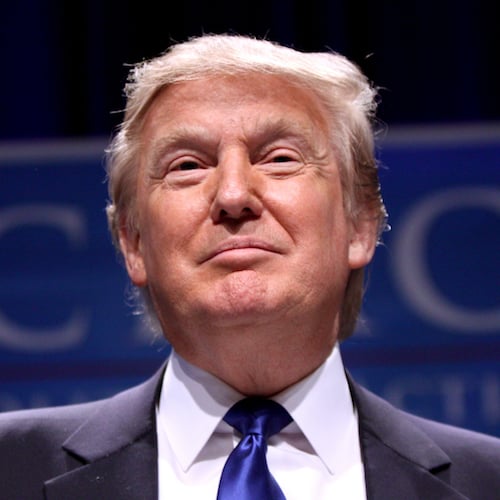
1. Donald John Trump
> Net worth: $2.9 billion – $10 billion
> In office: 2017-
> 45th President
Even at the lowest estimate, and when adjusting for inflation, Donald Trump is far and away the wealthiest person ever to be president. His precise net worth, however, is difficult to gauge. Media estimates, his FEC financial disclosure, and statements from his own campaign vary widely. Bloomberg and Forbes estimated Trump’s net worth at $2.9 billion and $4 billion, respectively. Trump, meanwhile, claimed a net worth of $10 billion while on the campaign trail. While he was expected by many to divest himself of his assets, perhaps by selling them to the public and putting the proceeds in a blind trust, Trump has kept ownership of his empire, merely granting temporary control of his businesses to his two eldest sons.
Methodology:
The net worth figures of the 10 wealthiest presidents are in 2016 dollars. Because several of the presidents, particularly in the early 19th century, made and lost huge fortunes in a matter of a few years, the net worth of each president reflects peak wealth. In the case of each president, we have taken into account hard assets such as real estate, estimated lifetime savings based on work history, and inheritance. We also considered annual salaries, incomes earned from royalties on books, ownership of companies, yields from family estates, and other forms of income.
The net worth of presidents that died in old age was easier to estimate, as they almost always owned all of the wealth they stood to gain from inheritance and trusts. Determining the exact wealth of men like John F. Kennedy, who died at 46, was substantially more difficult. We estimate Kennedy’s net worth was $1.1 billion based on the total size of his family’s estate. However, because Kennedy died before he inherited most of these funds, his net worth was enough to justify his inclusion on this list but not sufficient to surpass Washington or Trump.
Take This Retirement Quiz To Get Matched With A Financial Advisor (Sponsored)
Take the quiz below to get matched with a financial advisor today.
Each advisor has been vetted by SmartAsset and is held to a fiduciary standard to act in your best interests.
Here’s how it works:
1. Answer SmartAsset advisor match quiz
2. Review your pre-screened matches at your leisure. Check out the
advisors’ profiles.
3. Speak with advisors at no cost to you. Have an introductory call on the phone or introduction in person and choose whom to work with in the future
Take the retirement quiz right here.
Thank you for reading! Have some feedback for us?
Contact the 24/7 Wall St. editorial team.

